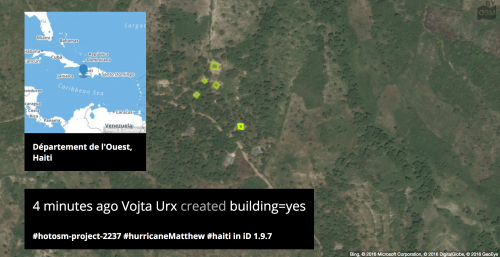[ed. note: Data @ IFRC is a blog series to share highlights from data-driven Red Cross Red Crescent national societies, learning opportunities and thought pieces on all things data from ethics to evidence.]
Co-creating spaces and networks to get people involved with technology has always been my passion. At the International Federation of Red Cross Red Crescent, I am contributing to a movement-wide initiative to build a data-driven organization making evidence-based decisions. The role is leading Data Literacy Programs. For years, I’ve been building data learning and use into communities, software projects, NGOS and research institutes. Now, I have an opportunity to support a vibrant network. Join me on this journey as I write as we go. This is a prototype newsletter to serve the community. Feedback welcome.
Mapping with the American Red Cross
Around the world, mappers continue to add details to support efforts in Haiti in the wake of Hurricane Matthew. You can see real time edits by clicking this. Also see the overall edit statistics here is a link of global changesets. Some of the projects are being lead by the team at American Red Cross (you can see the progress on the HOTOSM Task Manager (Task Manager – a way for people to divide up the work.)
Number of OSM Contributors: 2,145
Number of Map Changes: 2,734,621
Total number of Changesets: 31,722

More or Less 5 minutes to learn
1. How to build multi-line data viz from Infogr.am (3 minute video)
2. What is Data Science?
Everyone keeps changing the definition. Over at Data Science Central, they’ve aggregated a list of articles to help you wrap your head around it.
15 hours, more or less, to learn
Free: ESRI is hosting a MOOC “Going Places with GeoSpatial Analysis”
Free: Data Visualization: Principles and Practices
XKCD:Self-Description

(Source: XKCD)
Big Ideas
How do we become data literate organizations? Well, over in the social media marketing world, Ryan Holmes is sharing tactics to help organizations become more digital literate. How can we build small interventions and big impacts within our organizations.
“The problem — this digital skills gap — was deeper and more pervasive than I realized.” – Ryan Holmes, Hootsuite.
What about small data?
With all this talk about big data, I have been waiting for more praise for small data. There is data nutrition (re:insights) in all types of data. Hamad Haddadi, former colleague, shared a book from some of the Small Data Lab folks: Small Data: tiny clues that uncover huge trends. (Added it to my reading list.)
Measurement
“How to measure” and “what to measure” seems to be constant debate. The Social Progress Imperative launched their SDG( Sustainable Development Goals) measurement report card. Can we or should we use this methodology or a hybrid for NGO programs? And, should we even be measuring unlike things? A recent ICTWorks article shares some thoughts on the value of ranking systems:
“I have a proposal – it’s modest and unsolicited: stop funding rankings. Start, instead, funding internal capacity building workshops – invite experts, practitioners, and providers (whose time you pay for) to start from the issues and your context, and build practical, ethical, user-centered approaches from the ground up.” – Sean Martin MacDonald
Audio Book
Weapons of Math Destruction: How Big Data Increases Inequality – Cathy O’Neil
I’ve been listening to this audio book for a few weeks. When we think about barriers for using data in humanitarian response, it is always good to know what the machines are up to and some of the ethical questions to consider.
Help wanted
What kind of content would you like to see in my Data reports? Do you have links to share? Send it all my way – heatherleson at gmail dot com.